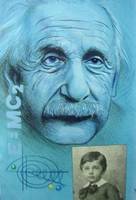
Albert Einstein 1870 - 1955

2005 commemorates a century since the publication of the great physicists Einstein's three papers that revolutionized the world.
To many of us the work of such creative thinkers is beyond our comprehension but scientists do not think differently than us, instead they apply their intelligence in a much more focused way. They stretch them selves to the frontiers of their understanding driven by an intense curiosity.This is very much what you see every two year old engaged in.
Like the two year old the scientist is busy making sense of things, developing new stories and then proving and testing them. For them both it is a continual journey of meaning making and changing ones mind. They both work at the boundary of observation and imagination. And as Einstein reminded us, ‘Imagination is more important than knowledge.’
Einstein own school life was problematic and he even failed arithmetic! One of his quotes mentions that it is a miracle that the holy curiosity of children is not completely crushed by modern education! If we are to transform education, to develop the creativity and talent of all students, then we need to take Einstein’s advice that, ‘No problem can be solved by the same consciousness that created it – we need to see the world anew’.
If we want to make education engaging then we need to focus on uncovering and tapping into the talents of all students and to do this by exposing them to the disciplines of knowing by encouraging them to solve challenges with the same intensity of a two year old. In secondary schools this will require teams of multi disciplined teachers to work together sharing their intelligences planning exciting challenges to ensure all students are extended. To do this we would need to see ‘schools anew’ as they, and their curriculums, are currently locked into an outdated fragmented Newtonian mindset.
At the beginning of all learning is curiosity and with curiosity satisfied comes the delight of mastery – the joy of figuring it out which is the birthright of all students. Student’s questions should form the basis of learning at all levels. Innovative teachers can still ensure that appropriate curriculum demands are covered and can introduce interesting challenges to motivate student’s questions.
Innovative teachers will in turn value student’s prior ideas (theories or stories) and then work alongside the learners challenging them to clarify, deepen and if necessary change their thinking.
Scientists like Einstein do what they do because it is fun! As one scientist said, ‘I couldn’t wait to wake up in the morning!’ and another said, ‘We were like children playing.’
Isaac Newton (whose mechanical view of the world was replaced by Einstein’s theory of relativity) before his death said, ‘I do not know what I may appear to the world, but to myself I seem to have been only like a small boy playing on the sea shore, and diverting myself in now and then finding a smoother pebble or a prettier shell than ordinary while all around lay undiscovered the great ocean of truth lay all undiscovered before me.’
Scientists are people who just can’t let go of an idea. They feel ‘acute discomfit’ at incomprehension. Einstein took eleven years of concentration to produce the general theory of relativity! One writer called this desire the ‘rage to know’. They share this with the two year old and, if schools were to be ‘seen anew’, this’ rage to learn’ would continue. Currently, for far too many students, the ‘holy spirit of inquiry’ is crushed’.
If we want to develop such passionate learners we must transform schools so they are seen by students as the most interesting place to be; a place where students face up to trying to answer the questions that concern them. Teachers in turn would need to re-imagine their role to one of a learning coach. Such teachers would need to exposing students to new ideas and challenge all students to push the frontiers of their personal knowledge. Like scientists students should become obsessed with getting their stories right. They have to learn to make up their own minds and not to accept uncritically what others tell them
We need a ‘new equation’ for our schools.
1 comment:
It has always been amazing to me that so many creative people, in a range of fields, have found schooling problematic. Creating school to cater for talents must be the future?
Post a Comment